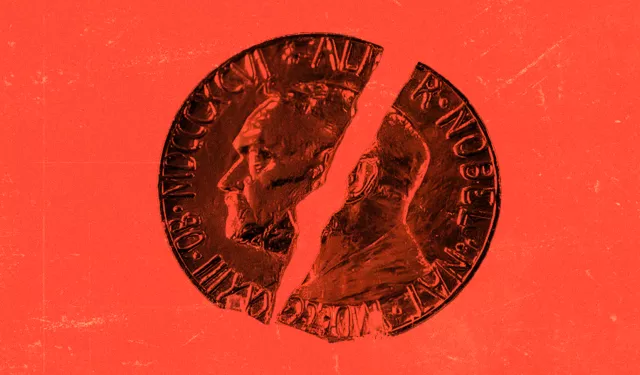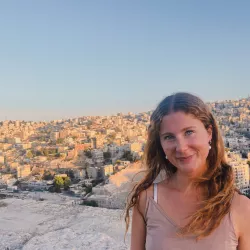
The Nobel Prize for ‘Peace Through Force,’ the Western way
This month, Venezuelan opposition leader María Corina Machado—a right-wing politician who supports US military intervention in her country in the name of “democracy”—won the Nobel Peace Prize. The Nobel committee described her as “a brave and committed champion of peace,” praising her for keeping “the flame of democracy burning amid a growing darkness.”
But Machado’s win drew sharp criticism given her ties to far-right figures such as Benjamin Netanyahu, Jair Bolsonaro, and Donald Trump, whose own name was also floated as a Nobel contender, raising deeper questions about the meaning of “peace” as defined by the prize and its committee.
Over the past two decades, Venezuela has shifted from Hugo Chávez’s populist socialism to Nicolás Maduro’s deepening authoritarianism, marked by economic collapse, mass displacement, and heavy repression. Amid this, Machado emerged as one of the regime’s most prominent opponents. She gained popular support in the disputed 2024 elections, when the opposition refused to recognize the defeat of its candidate Edmundo González. This triggered a new wave of repression that forced Machado into hiding. Since then, she has called for stronger international intervention in Venezuela, convinced that only the credible threat of military force could restore democracy to her country.
Machado’s rhetoric has often sounded more like a call to war than a call to peace. She has supported sanctions that deepened Venezuela’s humanitarian crisis and backed the Trump administration’s naval deployment in the Caribbean, just off Venezuelan shores. She is also aligned with Israeli Prime Minister Benjamin Netanyahu, who faces charges at the International Criminal Court. She has pledged to move her country’s embassy from Tel Aviv to Jerusalem—a move that defies international law, UN resolutions, and Palestinian rights. Her political stance fits squarely within Western right-wing rhetoric and interests.
Expressing gratitude for what she termed his “decisive support for our cause,” Machado dedicated her Nobel Prize to Donald Trump, a man who is, himself, accused of igniting wars, fueling racism, and supporting colonial violence.
Trump has maintained that he merits the Nobel Peace Prize, citing his claims to have “ended eight wars” and “saved millions of lives.” Yet his record—marked by his trademark “bully diplomacy,” mass deportations, the demonization of migrants, and support for colonial and genocidal regimes—shows that his idea of “peace” amounts to little more than the legitimization of power and force. The recent “peace deals” he brokered in the Middle East ultimately served to normalize apartheid and widespread state violence.
Machado’s victory, paired with Trump’s self-styled image as a peacemaker, reveals a troubling vision of peace, one that blurs the line between power and justice, domination and diplomacy. Once intended to recognize those who challenged injustice in pursuit of genuine peace, the Nobel Peace Prize has become a reflection of the West’s own vision of peace—and a tool for rewarding those who uphold it.
Who defines peace?
Given its composition, it’s no surprise that the Nobel Committee’s worldview remains deeply Eurocentric, where Western values ultimately determine what counts as “peace.” This, despite the fact that the West itself has so often been the architect of the very conflicts the prize claims to address.
The Nobel Peace Prize was established in 1895 by Swedish industrialist Alfred Nobel, the inventor of dynamite, to be awarded to the person or institution that had done the most or the best work for “fraternity between nations, for the abolition or reduction of standing armies, and for the holding and promotion of peace congresses.”
Unlike the scientific Nobel prizes awarded in Stockholm, the Peace Prize is administered by a committee appointed by the Norwegian Parliament. Nobel chose Norway to host the prize for its political neutrality at the time, seeing it as best placed to uphold the award’s moral integrity.
The committee typically consists of five members who review nominations, commission background research, and draw up the final shortlist. Parliament usually selects them from among retired politicians rather than international experts or peace activists. In other words, the meaning of “peace” is defined by five members of Norway’s political elite—while voices from conflict zones and the Global South remain largely absent.
The committee defines its vision of peace through ideals such as fraternity, tolerance, and trust—and through building institutions that allow people to live free from fear and deprivation. It embraces a distinctly Western definition rooted in nineteenth-century European diplomacy, where “peace” meant stability between sovereign states, not justice for peoples under colonial domination.
This conception ignores structural and colonial violence, portraying peace merely as cooperation among nations rather than the culmination of struggles for liberation from domination.
In academic circles, many speak of a divide between the idea of “liberal peace” and “plural peaces”: the former built on democracy, markets, and institutions; the latter rooted in local, cultural, and spiritual values. The Nobel Prize largely adheres to the concept of liberal peace, turning it into a kind of civilizational commodity—a Western moral product offered to “others.”
In doing so, the prize reinforces a narrow definition of a “good order,” in which peace becomes synonymous with Western hegemony.
Despite claims of neutrality—and assurances from this year’s committee chair, Jørgen Watne Frydnes, that pressures, political affiliations, or media speculation play no role in the selection process—the Nobel’s history tells another story.
The committee has long reflected Western biases and embraced a Eurocentric worldview, granting the prize mostly to Western figures, or to those who align with Western narratives of peace and progress in other parts of the world.
Diplomats and killers
It has, of course, recognized individuals who have genuinely advanced peace—from Martin Luther King Jr. to Malala Yousafzai. But in many cases, it has rewarded figures whose actions starkly contradict the essence of peace.
Among the most controversial laureates is Henry Kissinger, former US National Security Advisor and later Secretary of State, who received the award in 1973 for his efforts in negotiating the Paris Accords to end the Vietnam War.
The accords were hailed as a diplomatic triumph, yet they were brokered by a man who oversaw bombing campaigns in Cambodia and Laos, pursued policies that claimed countless civilian lives, and prolonged the war rather than ending it—all without ever being held to account.
Kissinger’s 1973 award stands as a defining example of how the committee has often mistaken diplomatic theater for genuine peace. It exposes the prize’s role as a form of soft power serving US and allied interests—recasting aggressors as peacemakers, moral leaders, and Cold War heroes, and rewarding the use of force as if it were an act of humanitarian virtue.
Another stark example came in 1993, when the world watched Israeli Prime Minister Yitzhak Rabin and Palestinian Liberation Organization Chairman Yasser Arafat shake hands on the White House lawn after signing the Oslo Accords, overseen by US President Bill Clinton. That moment, celebrated as a symbol of reconciliation after decades of conflict, led to the 1994 prize being awarded to Arafat, Rabin, and Foreign Minister Shimon Peres “for their efforts to create peace in the Middle East.”
In reality, these “efforts” cemented a framework for managing the occupation rather than ending it. The Oslo Accords offered the Palestinians very limited self-rule, without control over borders, security, or resources.
It was a neocolonial form of governance, yet the Nobel Committee chose to honor its architects. The award granted Arafat—long branded a “terrorist”—a stamp of Western acceptance, while whitewashing Rabin, one of the architects of the 1948 Palestinian expulsion who infamously urged Israeli forces to “break the bones” of Palestinian civilians during the First Intifada, and Peres, the architect of Israel’s nuclear arsenal. Peres would later authorize the 1996 Qana massacre in Lebanon. Meanwhile, the US quietly reinforced its image as a benevolent mediator.
In 2012, the prize went to the European Union for its contribution to “the advancement of peace and reconciliation, democracy and human rights.” The decision drew wide criticism as a self-congratulatory gesture toward a bloc that imports arms, enforces destabilizing austerity in southern Europe, and takes harsh stances toward refugees.
“Acceptable” and “non-acceptable” peace
The pattern of Nobel winners exposes bias—made clearer still by its omissions. From champions of nonviolence and justice to thinkers whose visions challenge Western frameworks, the omissions suggest that the prize functions less as a moral standard than as an instrument of diplomacy.
The most famous omission is Mahatma Gandhi. Despite being nominated five times, the leader of India’s nonviolent independence movement never received the prize. Colonial prejudice and the committee’s discomfort with anti-imperial movements played key roles. Gandhi’s challenge to Western empire posed a political inconvenience for a prize rooted in those same imperial structures. His philosophy of resistance was too radical for the mindset of five Norwegians in mid-twentieth-century Europe.
The same pattern echoes across the Global South. Anti-colonial leaders like Amílcar Cabral, Patrice Lumumba, and Frantz Fanon—who tied liberation to dignity and justice, envisioning a deeper peace than the imperial figures the prize sought to glorify—were also never recognized by the prize.
Time and again, the Nobel Committee has ignored anti-colonial and Indigenous struggles across Africa, Latin America, and the Middle East. It has rewarded only post-conflict diplomacy—but only once it carries Western approval—rather than honoring liberation movements at the height of their fight for just peace, freedom, and dignity.
The Nobel Committee’s idea of “peace” has long reflected Western moral and strategic hierarchies. Between 1901 and 2025, the prize has been awarded 106 times to 143 laureates—112 individuals and 31 organizations. Nearly two-thirds of those winners come from Europe and North America, with Europe accounting for about 45% and the United States for another 20%. By contrast, Asia, Africa, and South America combined represent less than 30% of recipients. The version of peace celebrated by the committee, then, is one shaped by Western values, where colonialism and power still define the global order.
Even when winners come from the Global South, they often embody what might be called an “acceptable resistance”—morally compelling but politically safe from a Western perspective. Figures like Shirin Ebadi (2003), Liu Xiaobo (2010), and Abiy Ahmed (2019) challenged non-Western authoritarianism, but rarely Western imperialism.
Their actions, framed in the language of liberal individualism and universal human rights, fits neatly within the Western narrative of progress—reinforcing a worldview in which resistance to imperialism is rarely recognized as a form of freedom.
The nomination process itself is shaped by Western standards, amplifying voices that serve a particular global agenda while excluding those that resist it. This weakens the prize’s moral standing, reinforcing its image as a celebration not of peace, but of power.
For example, many called for the Nobel to honor Palestinian journalists documenting genocide and occupation. Yet no movement or individual who has openly challenged US weaponry or the violence it enables has ever been recognized.
With María Corina Machado accepting the prize this year—and figures like Trump vying for it next—it is crucial to reexamine what the Nobel Peace Prize truly represents. It has become a mirror of global hierarchy: an award for “peace through force,” not the peace of justice and freedom.
Peace was never a Western invention—and it cannot be solely defined, managed, or bestowed according to Western political interests.
Published opinions reflect the views of its authors, not necessarily those of Al Manassa.
